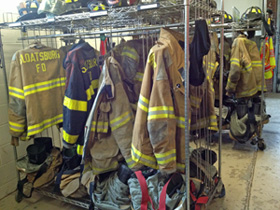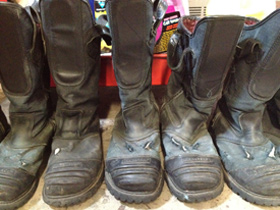Inside Sloatsburg Fire Department Station House 15 turnout gear hangs neatly on racks, labelled with the names of individual firefighters and ready to wear at a moment’s notice. One faded and worn tan jacket in particular has a dark patch where the heat from a training exercise seared the arm and shoulder area, rendering that set of gear unsafe and unusable. There’s also a row of beat Power Toe fire boots, part of relinquished equipment used for training, that would look great in a mosh pit but not for fire rescue. The good news is that the department is scheduled to replace some of its outdated fire gear, with fire fighters already being measured for their new black coats and pants.
 Following a series of Fire Department and Village Board workshops that reviewed the department’s outdated gear and equipment, and various replacement budgeting options, the Village Board is in the process of issuing a 5-year, $100,000 Public Improvement Serial Bond to purchase fire gear, a new Public Works truck, and for other municipal improvements and repairs at both the Municipal Building and other village properties.
Following a series of Fire Department and Village Board workshops that reviewed the department’s outdated gear and equipment, and various replacement budgeting options, the Village Board is in the process of issuing a 5-year, $100,000 Public Improvement Serial Bond to purchase fire gear, a new Public Works truck, and for other municipal improvements and repairs at both the Municipal Building and other village properties.
“These are things that need to be done,” said Sloatsburg Mayor Carl Wright, discussing the planned village bond issue. “There’s no excitement, there’s no joy in saying, ‘you know, we’re going to have to fix a leak.’ Bonding is a natural way of taking care of long term projects. And everybody shares in the cost.”
 Wright said part of the monies from the new bond issue will go towards repairing the front stairs at the Municipal Building, fixing several problem roof areas in the building and repairing the roof at the Senior Center off Liberty Rock Road in the heart of the village.
Wright said part of the monies from the new bond issue will go towards repairing the front stairs at the Municipal Building, fixing several problem roof areas in the building and repairing the roof at the Senior Center off Liberty Rock Road in the heart of the village.
$35,000 of the bond will go toward 20 new units of fire gear at an estimated cost of $1750 per set of coat and pants. After additional research and deal-making by the department, the gear replacement cost has been reduced from original estimates of $3000 per unit to the current $1750 per unit. Village Trustee and Sloatsburg firefighter Pete Akey said that the bond is the first phase of replacing and updating fire department gear and equipment. “The immediate, expired gear will be replaced,” said Akey.
 The department currently has approximately 70 sets of turnout gear, with only 33 sets in full service. In previous workshops with the board, the fire department determined that by 2013, the department could be down to 11 sets of useable gear that comply with National Fire Protection Association (NFPA) standards
The department currently has approximately 70 sets of turnout gear, with only 33 sets in full service. In previous workshops with the board, the fire department determined that by 2013, the department could be down to 11 sets of useable gear that comply with National Fire Protection Association (NFPA) standards
“We’re still going to be needing replacement on different gear and different items, excluding the trucks. Trucks are altogether different animals. But this is a good start,” said Trustee Akey. The department has scheduled boot replacement for another time. “It’s safe to say fire boots will be purchased the next go around, but anyone needing them now due to damage will receive them asap. We cannot and will not risk the safety of our firefighters or village residents,” he said.
Wright stressed that the bond will be a 5 year loan that essentially replaces an expiring village bond payment. “So, next year we will be making our first payment for this new bond — replacing old money with new,” he said.
Municipal bonds are a tried and true means for towns, cities and local governments to raise money and pay for capital projects. Considered low risk and stable investments, municipal bonding generally requires all money raised by a bond sale to be spent on one-time capital projects within three to five years of issuance and often carries a special tax-exempt status. In exchange for upfront investment capital, bond holders receive principle and interest payments over time from the issuer, typically backed by the municipality’s revenues, primarily from property taxes. In the past, Sloatsburg has used Munistat Services, Inc. out of Port Jefferson Station, NY, as well as other debt management and security companies.
The village currently carries approximately $300,000 in bond debt related to municipal improvements, maintenance and debt consolidation costs.
The fire department is also working with experienced local grant writer Susan Daycock, who has submitted a grant proposal to cover additional gear and equipment. The department eventually needs to replace respirator equipment. Respirator systems cost nearly $5,000 per fireman, with SCBA (self contained breathing apparatus) face pieces and tanks adding another $1,000 apiece.
But grants are scarce these days and competition from other agencies and organizations for available funds is intense.
“Grants are no guarantee,” said Akey. “And everyone is going after them. If we’re fortunate to get a grant, and the bond, then you would have smiling faces all around.”


